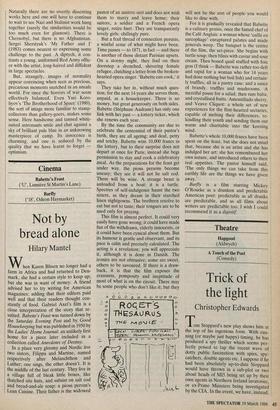Cinema
Babette's Feast (`U', Lumiere St Martin's Lane) Barfly (`18', Odeon Haymarket)
Not by bread alone
Hilary Mantel
When Karen Blixen no longer had a farm in Africa and had returned to Den- mark, she had a certain style to keep up; but she was in want of money. A friend advised her to try writing for American magazines: adding that their editors paid well and that their readers thought con- stantly of food. Gabriel Axel's film is a close interpretation of the story that re- sulted. Babette's Feast was turned down by the Saturday Evening Post and by Good Housekeeping but was published in 1950 by the Ladies' Home Journal: an unlikely first home for a piece later included in a collection called Anecdotes of Destiny.
In a place very gloomy and Nordic live two sisters, Filippa and Martine, named respectively after Melanchthon and Luther; one sings, the other doesn't. It is the middle of the last century. They live in a village full of bleak little boxes, like thatched site huts, and subsist on salt cod and bread-and-ale soup: a pious person's Lean Cuisine. Their father is the widowed pastor of an austere sect and does not wish them to marry and leave home; their suitors, a soldier and a French opera singer, retire hurt. They are transparently lovely girls: chillingly pure.
But a frail thread of connection persists, a wistful sense of what might have been. Time passes — to 1871, in fact — and there is another of those distant Parisian upsets.
On a stormy night, they find on their doorstep a drenched, shivering female refugee, clutching a letter from the broken- hearted opera singer. 'Babette can cook,' it says.
They take her in, without much ques- tion; for the next 14 years she serves them, unpaid, as a housekeeper. There is no money, but great generosity on both sides. Babette (Stephane Audrane) has only one link with her past — a lottery ticket, which she renews each year.
By the time the community are due to celebrate the centennial of their pastor's birth, they are all ageing; and deaf, petty and tetchy. Babette wins 10,000 francs in the lottery, but to their surprise does not depart at once for Paris; instead she begs permission to stay and cook a celebratory meal. As the preparations for the feast get under way, the pious persons become uneasy; they see it will not be salt cod. There will be wine. A strange beast is unloaded from a boat: it is a turtle.
Spectres of self-indulgence haunt the two sisters, as they dream in their starched linen nightgowns. The brethren resolve to eat but not to taste; their tongues are to be used only for praying.
This film is almost perfect. It could very easily have gone wrong; it could have made fun of the withdrawn, elderly innocents, or it could have been cynical about them. But its humour is gentle and observant, and its pace is calm and precisely calculated. The acting is a revelation; you will appreciate it, although it is done in Danish. The ironies are not obtrusive; some are sweet, others to be savoured. If there is a draw- back, it is that the film exposes the crassness, pomposity and ineptitude of most of what is on the circuit. There may be some people who don't like it; but they will not be the sort of people you would like to dine with.
For it is gradually revealed that Babette is a culinary genius, once the famed chef of the Café Anglais: a woman whose `caille en sarcophage' enraptured palates and made generals weep. The banquet is the centre of the film, the set-piece. She begins with turtle soup; then blinis with caviar and sour cream. Then boned quail stuffed with foie gras (I think — Babette was rather too deft and rapid for a woman who for 14 years had done nothing but boil fish) and certain- ly truffles, all in a pastry case: and a sauce of brandy, truffles and mushrooms. A merciful pause for a salad; then rum baba, and crystallised fruits. Amontillado sherry, and Veuve Cliquot: a whole set of new experiences for the flint-hearted sectaries, capable of melting their differences, re- kindling their youth and sending them out warm and charitable into the keening wind.
Babette's whole 10,000 francs have been spent on the feast, but she does not mind that, because she is an artist and she has indulged her art; she has remembered her own nature, and introduced others to their real appetites. The pastor himself said, `The only things we can take from this earthly life are the things we have given away.'
Barfly is a film starring Mickey O'Rourke as a drunken and predictable American poet: predictable as all drunks are predictable, and as all films about writers are predictable too. I wish I could recommend it as a digestif.
























































 Previous page
Previous page